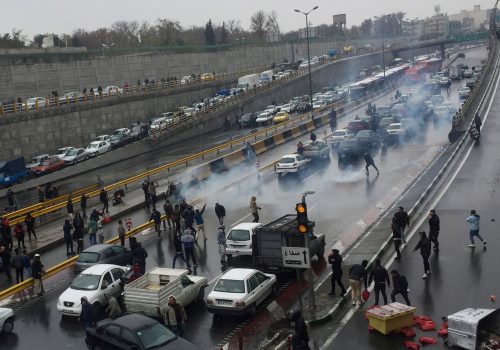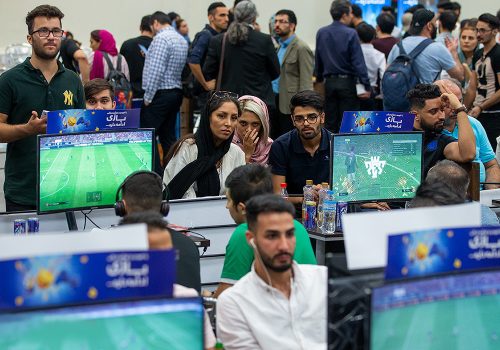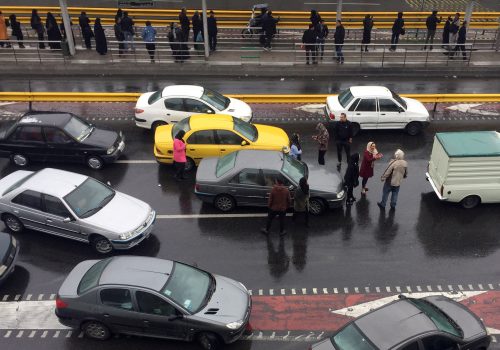Down the ‘Rathole’: How a rapper channels Iran regime change discourse
Iran’s new rap sensation Toomaj Salehi was barely out of prison in September when he pinned the following tweet on his account, declaring that he won’t stay silent:
Shall the pen that doesn’t write break
Behold what these people have suffered
The little-known rapper rose to transnational fame in September, following his arrest and subsequent release by Iranian authorities. His audacious rap full of critique for the clerical establishment and its “collaborators” was stunning given he is based in Esfahan and vulnerable to punishment. He was captured in a raid on his house, accused of “spreading propaganda against the state,” and released a week later. His legal case is pending.
Both the content of Salehi’s hard-hitting songs, as well as the debates they have produced, speak to a transformed Iranian media landscape, where the borders between the Iranian diaspora and Iranians in Iran have grown blurred, and regime change discourse increasingly rules the conversation.
These changes in the political mood and shifting media landscape were best reflected in Salehi’s most popular track, “Rathole,” where he pulls no punches. He attacks the Iranian state and all those inside and outside of Iran whom he accuses of complicity, charging that “there is no neutrality in this war”—a war between the oppressor and the oppressed, an age-old Iranian paradigm.
Previous rappers based in Iran, who used their rhymes to poke critique at given social and political conditions, were not only much more subdued in their attacks, but also left room for reforms from within.
Salehi’s work, on the other hand, mirrors a general mood that considers the doors shut on that possibility.
In “Rathole,” he directs his anger at “hack journalists, tabloid reporters, court artists, officers, thugs, mercenaries, forced executioners, useful idiots, appointed officials, opportunist reformists,” and tells them to spend whatever dollar they’ve received to buy a rathole. The song proclaims the end of times for all those who are complicit with the regime and warns them to hide from the wrath of the people, threatening: “Remember, blood can only be washed with blood.”
While the regime change discourse is as old as the forty-two-year-old Islamic Republic, it grew exponentially during the Donald Trump era. Early in his tenure, the former US president pulled out of the multilateral 2015 Iran nuclear deal and reimposed sanctions under a “maximum pressure” campaign, putting an end to Iranians’ hopes for improved economic and political conditions. Since then, two simultaneous developments have contributed to strengthening the push for regime change in Iran.
On the one hand, the Trump administration openly sought regime change in Iran and poured money into projects that pursued this aim. One of these was the well-documented Iran Disinformation Campaign (Iran Disinfo), where the State Department funded operatives in the US who spread disinformation about Iranian-American journalists, think tankers, and human rights activists whom they found too soft on Iran or too critical of Trump. Iran Disinfo and hundreds of other online trolls branded these people as “regime lackeys,” “Islamic Republic mouthpieces,” and the like. Sometimes, all it took for an independent journalist to land in this category was to humanize an Islamic Republic official by mentioning that they liked poetry, or to blame Iran’s economic malaise equally on US sanctions rather than just on governmental mismanagement and corruption.
These accounts were joined by other, perhaps independent sources outside of Iran, whose programs—often distributed on YouTube and other social media apps like Instagram and Telegram—paint a diabolical image of the Iranian government and reserve special venom for these alleged “collaborators.” A singular focus on maligning these people seems to distinguish this kind of programming.
In a parallel process, the regime change discourse garnered support not just by sympathizers of royalists or the Marxist-Islamist Mojahedin Khalq, but also by ordinary, independent Iranians and groups inside and outside of Iran—people who no longer see the possibility for reform from within (especially after the 2019 November protests in which security forces reportedly killed more than three hundred individuals and arrested thousands).
Additionally, suffering from drastically worsened economic conditions and an 80 percent currency devaluation, Iran was then hit by the global pandemic with the highest cases and deaths in the Middle East, compounding a general sense of despondency. The latest straw was the engineered election of Iran’s new president, Ebrahim Raisi. Accused of gross human rights violations for his role in the infamous 1988 mass executions of political prisoners, his presidency was particularly demoralizing for many.
Whereas US-based regime change advocates are often funded by conservative money and draw on disinformation and conspiracy theories for their discourse, the rapper Salehi relies on the economic and social realities of people’s lives to power his verse. Whereas his work is rooted in Iran and reflects Iranians’ daily discontent, the work of the regime change advocates outside circulates in echo chambers removed from the country. And, yet, there is now an overlap between the sentiments in these two worlds.
Only several years ago, there was still a strong faction of Iranians inside and outside the country that advocated for better relations and reform from within. The cascading events of recent years have led to a weakening of that faction and magnified voices for regime change.
As such, it is no surprise that “Rathole” instantly reverberated within the Iranian media and social media spheres.
But there is an important difference between the two discourses, too. While some regime change advocates will argue for that transformation at all costs—whether it’s crushing US sanctions or military intervention—Salehi continues a tradition in Rap-e Farsi that calls on Iranians to take charge of their own fate. That also means abandoning the Islamic Republic’s Shia Messianic ethos:
Don’t wait for the savior, there is no news
You’re your own savior, you’re the hero
If you and I become one, we are without limits
We’re the saviors of our time, we are the Mahdi
After his release from prison, the tough rapper—now a little broken—choked up in a video posted on social media on September 21 when he spoke of his surprise and gratitude for the support he had received. “When I was in there, I thought, no one’s even thinking of you right now.”
Prior to his arrest, Salehi’s followers on Instagram and Twitter were in the hundreds and most social media accounts that have commented on his work were located outside of Iran.
Critical Rap-e Farsi used to have a strong following in Iran and rappers like Hichkas, the so-called godfather of Iranian rap, and Yas were vastly popular in the country before they were sensationalized in the West. Following the 2009 post-election protests known as the Green Movement, the clerical establishment established a cyber police and securitized online spaces to the extent that many politically critical rappers left the country, and those in Iran no longer create widespread visibility with their work for fear of getting into trouble.
Since the 2009 internet crackdown, it has increasingly been diaspora media outlets that have provided not just an open space for dialogue on internal affairs, but also the tone.
Within this context, the audacity with which Salehi has released half a dozen highly critical tracks like “Rathole,” “Normal,” “Dice,” and “Turkmenchay” speaks to two developments. First, discontent with the state and worsening life conditions have passed a sort of threshold, where Salehi feels emboldened to speak out. Second, this seemingly fearless openness is a spill-over effect from daily social media use, where diaspora media content and collective spaces, such as WhatsApp groups and audio-only app Clubhouse, have facilitated an environment in which Iranians have for years now engaged in government critique.
In the highly divided Iranian social media sphere riddled with disinformation infused by both foreign and Iranian agents and trolls, Salehi’s angry rap points to a unifying trend across various factions of Iranians and media platforms.
Nahid Siamdoust is an assistant professor of media and Middle East studies at the University of Texas at Austin, and author of “Soundtrack of the Revolution: The Politics of Music in Iran.” Follow her on Twitter: @nahid8.
Image: An Iranian man reacts to the camera while standing with his friend out of a cultural center in northern Tehran on May 28, 2021. Iranians will vote to elect the new President on June 18 amid the new corona virus outbreak in Iran. (Photo by Morteza Nikoubazl/NurPhoto)


